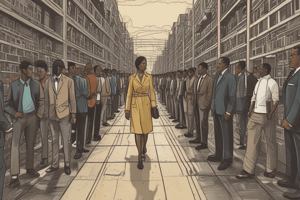Podcast
Questions and Answers
What does the author imply about the effect of the slave's master hearing the slave's 'smart and impressive' replies?
What does the author imply about the effect of the slave's master hearing the slave's 'smart and impressive' replies?
- The master felt guilty about the slave's condition and was motivated by a heightened sense of social responsibility to emancipate the slave.
- The master was humbled and learned to respect the slave as an equal.
- The master was challenged by the slave's perspective and was forced to confront the moral implications of his actions. (correct)
- The master was impressed by the slave's intellect and realized the slave deserved freedom.
The author uses the phrase "silver trump of freedom" to symbolize:
The author uses the phrase "silver trump of freedom" to symbolize:
- The promise of ultimate freedom that is unattainable but still inspires the author.
- The hope for a better future that motivates the author to continue striving for freedom.
- The powerful call to action for slaves to fight for their liberation.
- The constant reminder of the author's freedom, which serves as a source of both inspiration and torment. (correct)
How does the author's reading of Sheridan's speech on Catholic emancipation influence his perspective on slavery?
How does the author's reading of Sheridan's speech on Catholic emancipation influence his perspective on slavery?
- He finds validation for his own thoughts and feelings about the injustice of slavery. (correct)
- He recognizes the similarities between the struggle of Catholic emancipation and the fight for the abolition of slavery.
- He gains a deeper understanding of the political complexities involved in the abolitionist movement.
- He develops a more nuanced understanding of the motivations and tactics of slaveholders.
How does the author's newfound knowledge about slavery affect his overall emotional state?
How does the author's newfound knowledge about slavery affect his overall emotional state?
What is the author's main intention in describing his longing for the ability to stop thinking?
What is the author's main intention in describing his longing for the ability to stop thinking?
The phrase "horrible pit" refers to:
The phrase "horrible pit" refers to:
What is the author suggesting by comparing himself to 'the meanest reptile'?
What is the author suggesting by comparing himself to 'the meanest reptile'?
What is the central message of the passage?
What is the central message of the passage?
What is the primary motivation behind the narrator's actions in learning to read?
What is the primary motivation behind the narrator's actions in learning to read?
How does the narrator's relationship with the white boys embody a complex understanding of the social dynamics during this time?
How does the narrator's relationship with the white boys embody a complex understanding of the social dynamics during this time?
What is the underlying message conveyed by the narrator's use of the term "valuable bread of knowledge"?
What is the underlying message conveyed by the narrator's use of the term "valuable bread of knowledge"?
What is the significance of the narrator's reference to the dialogue between a master and his slave in "The Columbian Orator"?
What is the significance of the narrator's reference to the dialogue between a master and his slave in "The Columbian Orator"?
How does the narrator's use of the phrase "almost an unpardonable offence" contribute to the overall impact of the passage?
How does the narrator's use of the phrase "almost an unpardonable offence" contribute to the overall impact of the passage?
What is the primary function of the narrator's rhetorical question, "Have not I as good a right to be free as you have?"
What is the primary function of the narrator's rhetorical question, "Have not I as good a right to be free as you have?"
What is the symbolic significance of the book "The Columbian Orator" in the passage?
What is the symbolic significance of the book "The Columbian Orator" in the passage?
What is the primary effect of the narrator's description of the conversation between the master and the slave in "The Columbian Orator"?
What is the primary effect of the narrator's description of the conversation between the master and the slave in "The Columbian Orator"?
Flashcards
Emancipation
Emancipation
The process of being set free from legal, social, or political restrictions.
Effect of reading
Effect of reading
Reading led to the slave's realization of his miserable condition and desire for freedom.
Sheridan's speeches
Sheridan's speeches
Powerful speeches advocating for Catholic emancipation and human rights.
Moral power of truth
Moral power of truth
Signup and view all the flashcards
Discontentment from knowledge
Discontentment from knowledge
Signup and view all the flashcards
Self-hatred
Self-hatred
Signup and view all the flashcards
Imagery of freedom
Imagery of freedom
Signup and view all the flashcards
Agony of thought
Agony of thought
Signup and view all the flashcards
Learning to Read
Learning to Read
Signup and view all the flashcards
Little White Boys
Little White Boys
Signup and view all the flashcards
Role of Errands
Role of Errands
Signup and view all the flashcards
Bread as Currency
Bread as Currency
Signup and view all the flashcards
Discussion of Slavery
Discussion of Slavery
Signup and view all the flashcards
The Columbian Orator
The Columbian Orator
Signup and view all the flashcards
Master-Slave Dialogue
Master-Slave Dialogue
Signup and view all the flashcards
Hope for Freedom
Hope for Freedom
Signup and view all the flashcards
Study Notes
Methods of Self-Education
- The author successfully learned to read by befriending and teaching white children.
- This involved using errands to find time for lessons and exchanging bread for knowledge.
- The author's network included children on Philpot Street, near Durgin and Bailey's shipyard.
- The author discussed slavery with these children, expressing a desire for freedom.
Impact of Reading
- The author gained access to "The Columbian Orator," which contained a dialogue about slavery.
- The dialogue showcased arguments for and against slavery, resulting in the master freeing his slave.
- The book also included a speech by Sheridan in favor of Catholic emancipation.
- These texts provided the author with arguments against slavery and strengthened their desire for freedom.
The Weight of Freedom
- The author's reading fueled a growing discontent with slavery, viewing slaveholders as criminals.
- This discontent led to a realization that knowledge illuminated the author's suffering and presented no immediate liberation.
- The awareness of their enslaved status brought anguish and the desire to escape their thoughts.
- The author wished they were an animal, anything to avoid their relentless self-reflection.
- The author felt the pursuit of freedom was omnipresent, a constant reminder of their unfulfilled desires.
Studying That Suits You
Use AI to generate personalized quizzes and flashcards to suit your learning preferences.




